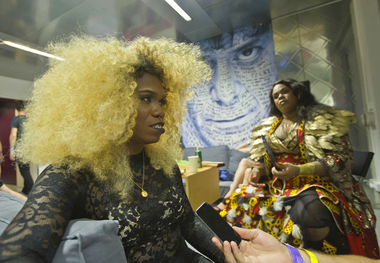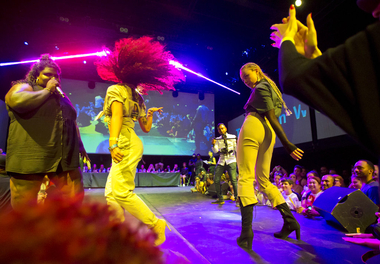Voguing revival; Paris LGBT+ community strike a political pose

PARIS (AP) — In garish makeup and dangerously high heels, a black male dancer's outstretched arms aggressively slice the air in time to the Paris nightclub music until suddenly, he drops "dead" on the floor.
Vogue, the '80s dance movement Madonna popularized in her hit 1990 song of the same name, is experiencing a revival in France. It's not just a flamboyant pastime. For many minority French communities who feel alienated over tensions arising from divisive anti-gay marriage protests and the anti-immigration National Front, it's a statement of defiance.
Many gay black and Arab youths — especially those from Paris' less affluent and religiously conservative suburbs — see Vogue dance events as safe places in which their racial and sexual identities can be fully expressed without fear of reprisals.
"Not many people realize but voguing, it's political. When they were lining the streets in France with angry anti-gay marriage signs, the others were expressing themselves with dance on the Vogue runway," said dancer Marion Tiger Melody.
"The increased popularity of the (far-right) National Front (party) must also have had an impact," she added.
France is now the world's biggest voguing hub outside of New York. Talented young dancers and drag queens in outlandish costumes face off in competitions, showing off moves inspired by the poses of fashion models in the pages of Vogue magazine.

The dance first hit the mainstream with Madonna's 1990 song and video "Vogue," in which the singer lists a roll call of all-white Hollywood icons — Marilyn Monroe, James Dean, Grace Kelly, and Bette Davis — while calling on people to "strike a pose."
But the original movement was neither white nor mainstream and always closely linked with bold identity politics. Madonna was criticized for her lyrics, which some said appropriated the movement for the white population (even though black dancers featured in the video.)
The moves were first popularized in 1980s New York during exuberant Vogue Balls that served as a refuge for the black and Latino LGBT community. At a time when the AIDS epidemic in the city fueled homophobia and racism was rife, many found an accepting community in the contests.
One of the movement's founders, Willi Ninja, who starred in the award-winning 1990 documentary about New York voguing, "Paris is Burning," had wanted to bring the dance to the French capital before he died in 2006 of an AIDS-related illness.
The movement pirouetted to Paris in 2012, the year tens of thousands of people protested across France against plans to legalize same-sex marriage and there was an uptick in homophobic behavior.
The rise of the National Front, Marine Le Pen's right-wing anti-immigrant party that won a third of votes in France's presidential runoff last year, aggravated many young black Voguers who already felt ostracized.
French-born black drag queen Lasseindre Ninja, who had lived in New York before founding the French Vogue scene, feels that the perfect storm contributing to the dance's emergence in '80s New York — myriad minority groups, racism, homophobia — is present in today's Paris.
"Racism is still here ... Of course, it's even harder being gay in the (French) black community as everyone's religious and everyone takes the bible by the book," said Ninja, who sported a sparkling gown.
Stephie Mizrahi — a dancer in the 1980s at "Le Palace," France's answer to Studio 54 — said he was delighted to see the voguing scene in Paris flourish. It's "a safe-haven for LGBT people to express themselves and the harshness of daily life," he said.
Because many of the voguing participants are not out to their families, filming access to their events is strictly limited for fear of reprisals.
Harshness and aggression are running themes in the Vogue lexicon. There's the "death drop," a move that sees the dancer collapse on the floor before quickly bouncing up again. And the jerky, slicing style of Vogue arm movements were reportedly inspired by Bruce Lee's kung fu films.
Fashion and celebrity are also touchstones.
The Vogue community is divided into global fashion-themed houses, or teams, that dance off against each other, such as the House of Gaultier, House of Chanel and the House of Lanvin.
And for proof that its popular appeal lives on, look no further than Beyoncé, Rihanna, Azealia Banks and Willow Smith, who have all been influenced by the vogue style of dance.
Designer Jean Paul Gaultier, who has dressed Madonna, was invited as a guest jury member at one Paris Vogue contest. He reminisced about going voguing with the star in New York in 1990.
"To have been there at that moment, I'm really proud ... it was a small family in Brooklyn and New York and then it became global," Gaultier told The AP. "I'm excited to see this revival that's modernized and evolved."
With his trademark humor, Gaultier mused about the rise of French nationalism.
"I think they should give voguing lessons to Marine Le Pen," he said. "That would be a good solution, no?"
Copyright Associated Press, all rights reserved.
The Gayly. March 25, 2018. 2:00 p.m. CST.





